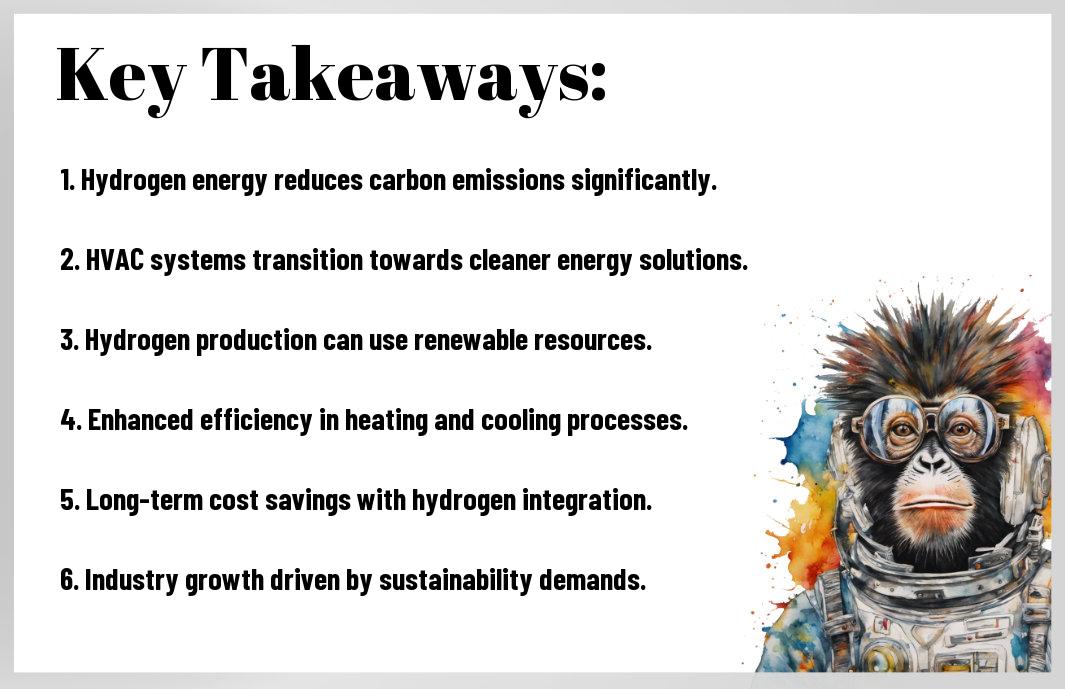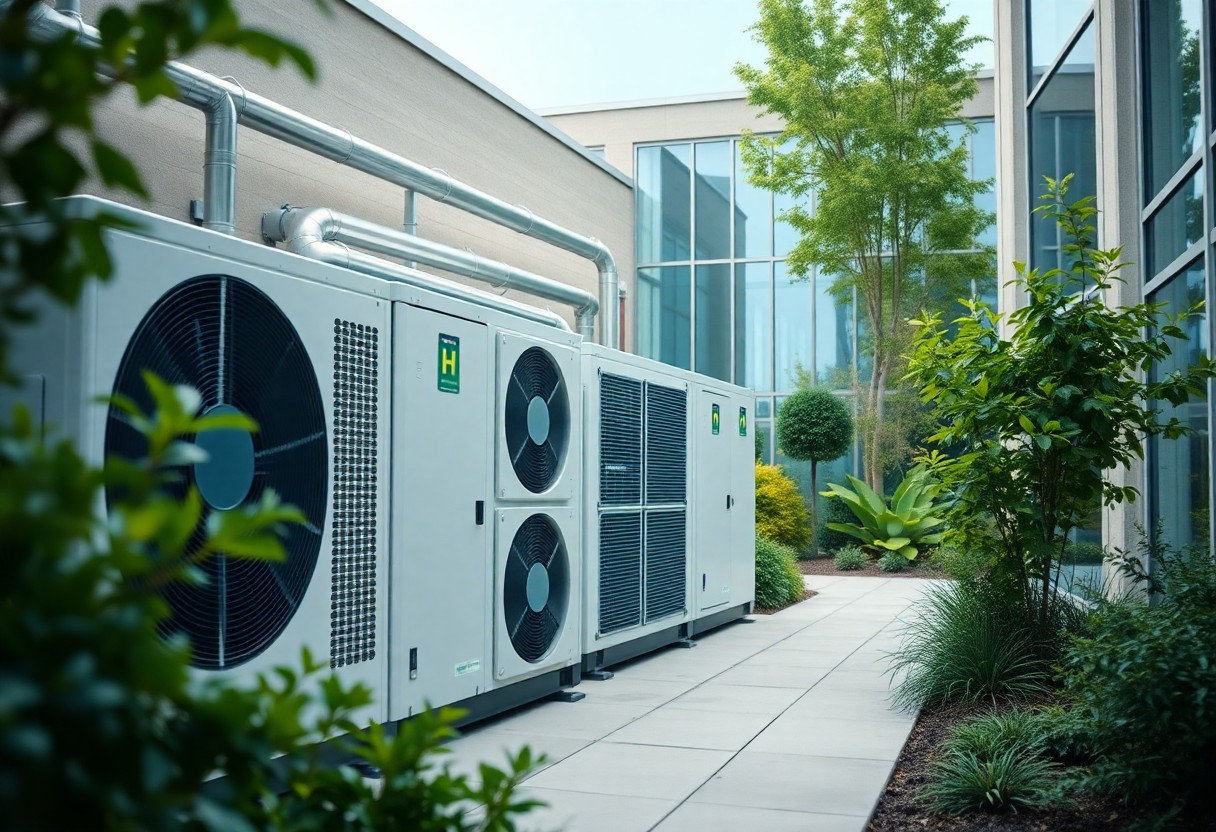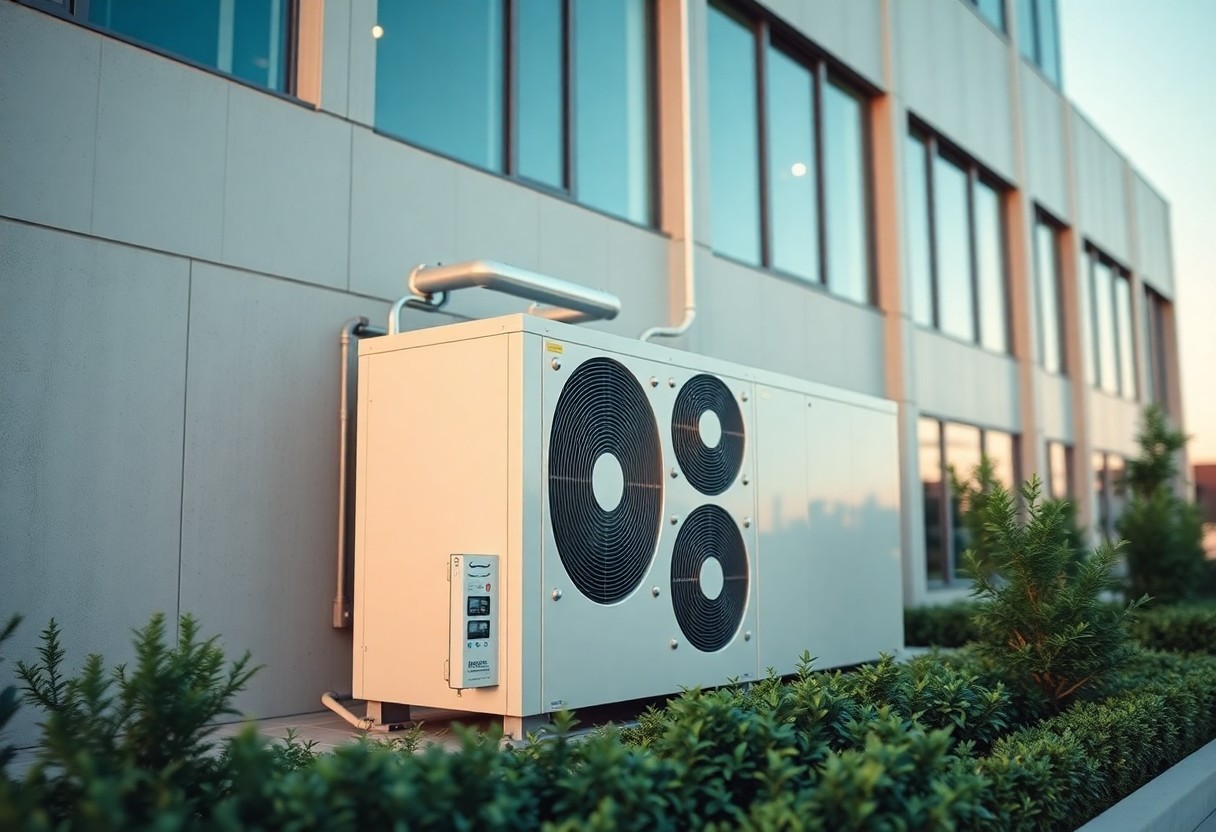Hydrogen Powered HVAC Systems: The Next Big Thing
Many homeowners like you are looking for sustainable and efficient solutions to replace traditional heating, ventilation, and air conditioning (HVAC) systems. With rising energy costs and environmental concerns, hydrogen powered HVAC systems represent a promising alternative that could greatly reduce your carbon footprint. Leveraging hydrogen’s abundant energy potential, these systems produce clean heat and cooling, making them a safe bet for the future. Stay informed about this innovative technology that could transform your home’s energy consumption and enhance your living environment.
Key Takeaways:
- Hydrogen powered HVAC systems offer a renewable alternative to traditional fossil fuel-based heating and cooling methods.
- The shift toward hydrogen energy aligns with global sustainability goals and reduces greenhouse gas emissions in the HVAC sector.
- Hydrogen can be produced from various sources, including water and organic matter, making it a versatile energy carrier.
- Current technologies are being developed to improve the efficiency and affordability of hydrogen powered HVAC systems.
- The integration of hydrogen as a fuel source requires new infrastructure, including pipelines and storage solutions, to be effective at scale.
- Government incentives and support policies are likely to play a significant role in accelerating the adoption of hydrogen powered HVAC systems technologies.
- Industry experts predict that hydrogen powered HVAC systems solutions could become a leading option in the market within the next decade, transforming energy consumption patterns in buildings.
Understanding Hydrogen as a Fuel Source
Your journey into the world of hydrogen as a fuel source begins by appreciating its unique qualities. Hydrogen is the lightest and most abundant element in the universe, consisting of just one proton and one electron. When utilized in an energy application, hydrogen can produce clean energy, emitting only water vapor as a byproduct when used in fuel cells. This property makes hydrogen a highly attractive option for the HVAC sector, where reducing carbon emissions is increasingly important. However, it’s important to understand that hydrogen exists in nature primarily in compounds rather than in its pure form, making extraction and production important.
Properties of Hydrogen
Against the backdrop of energy sources, hydrogen boasts a high energy content per unit weight—approximately three times that of gasoline. This high energy density means that hydrogen can offer significant power for heating and cooling systems. However, it also comes with challenges; hydrogen is highly flammable and requires careful handling and storage to mitigate risks. You need to understand that these properties make hydrogen both an exciting and a complex subject when integrating it into HVAC systems, demanding innovative safety measures alongside its numerous advantages.
Availability and Production Methods
After evaluating the properties of hydrogen, you should consider its availability and the various production methods available. Hydrogen can be sourced from natural gas through steam methane reforming (SMR), electrolysis of water, biomass gasification, and other techniques. Each method has implications for sustainability; for instance, electrolysis offers the potential for green hydrogen if powered by renewable energy sources, while SMR currently dominates the market but is tied to fossil fuel use.
For instance, the production of hydrogen through electrolysis allows for a sustainable approach, particularly when sourced from renewable energy like wind or solar. This method splits water into hydrogen and oxygen, making it incredibly promising for environmental goals. Emerging technologies in biomass gasification and other innovative methodologies are also gaining traction, presenting solutions to harness hydrogen while minimizing environmental impact. As a future-forward approach to HVAC systems, hydrogen not only serves as an energy carrier but also aligns with the global push for clean energy solutions.

The Role of HVAC in Energy Consumption
Now, when you consider the vast amount of energy consumed in residential and commercial settings, HVAC systems stand out as one of the highest contributors. They account for nearly 40% of total energy usage in homes and commercial buildings. This significant energy consumption not only leads to higher utility bills but also contributes to increased carbon emissions, raising concerns about environmental sustainability. As such, it is crucial for you to understand how current heating, ventilation, and air conditioning systems are impacting your energy footprint, especially in light of the growing focus on energy efficiency and renewable solutions.
Current Systems and Their Impact
Impact of conventional HVAC systems lies primarily in their reliance on non-renewable energy sources, which have adverse effects on both your wallet and the planet. These systems often operate at less than optimal efficiency, leading to excessive energy use that strains resources and results in higher greenhouse gas emissions. You might find that despite investing in the latest technology, your HVAC system may still fall short of achieving ideal efficiency rates, which can be frustrating and costly.
Benefits of Integrating Hydrogen
Systems that incorporate hydrogen for heating and cooling can reshape your approach to energy consumption significantly. By utilizing hydrogen as a clean energy carrier, you can drastically reduce the emissions associated with traditional HVAC technologies. This not only enhances the overall environmental impact but also helps in extending the lifespan of your HVAC units through reduced wear and tear from alternative energy sources. You may find that integrating hydrogen also provides uniform heating and cooling solutions, making your space more comfortable while maintaining efficiency.
The role of hydrogen in your HVAC system lies in its inherent qualities as a renewable energy source. As a fuel that emits only water vapor when consumed, it offers a pathway to achieve a net-zero carbon footprint. Furthermore, by investing in hydrogen-powered HVAC systems, you not only contribute to improved energy sustainability but also position yourself at the forefront of energy innovation. The transition to hydrogen can lead to lower operational costs and a significant decrease in reliance on fossil fuels, creating a healthier environment for future generations.
Advantages of Hydrogen Powered HVAC Systems
Environmental Benefits
With the pressing need to reduce greenhouse gas emissions, hydrogen-powered HVAC systems stand out for their environmental benefits. These systems produce zero carbon emissions during operation, making them a clean alternative to traditional fossil-fuel-based units. By switching to hydrogen as a fuel source, you not only enhance indoor air quality but also contribute to a healthier planet, aligning your values with sustainable living. This shift supports efforts against climate change, potentially leading to significant regulatory incentives and compliance advantages for your business or household.
Economic Implications
Between rising energy costs and the ongoing transition to cleaner technologies, the economic implications of hydrogen-powered HVAC systems are profound. Investing in these systems can yield substantial long-term savings on energy bills, especially as hydrogen production becomes more efficient and widespread. Furthermore, many governments are prioritizing hydrogen infrastructure development, which may lead to decreased operational costs and increased affordability of hydrogen supply in the near future.
At the same time, your investment in a hydrogen-powered HVAC could make you eligible for various government subsidies or tax incentives aimed at promoting green technologies. The growing hydrogen sector also means job creation in areas like production, distribution, and maintenance, which can strengthen your local economy. As demand for sustainable technologies rises, your early adoption of hydrogen HVAC systems may give you a competitive edge, positioning you as a leader in innovation while providing peace of mind regarding energy sustainability and cost management.
Challenges in Implementation
Despite the growing interest in hydrogen-powered HVAC systems, several challenges must be addressed before widescale adoption can occur. You may find that one of the primary hurdles is the need to adapt both existing infrastructure and establish new supply chains for hydrogen production and distribution. This transition will require significant investment in new facilities, pipelines, and distribution networks to ensure that hydrogen is readily available and accessible to consumers. As it stands, your area may not have the necessary infrastructure in place to support hydrogen as a mainstream energy source for heating and cooling systems.
Infrastructure Requirements
Above all, the success of hydrogen-powered HVAC relies heavily on robust infrastructure development. You should be aware that, currently, hydrogen production is predominantly sourced from natural gas through processes that emit carbon dioxide, which undermines its potential as a cleaner energy option. Transitioning to greener methods, such as electrolysis powered by renewable energy, may increase costs and complexity but is necessary for achieving environmentally sustainable outcomes. Without adequate infrastructure, your location may face limitations in both the availability and affordability of hydrogen, impacting the widespread deployment of these innovative systems.
Technological Barriers
Along with infrastructure needs, several technological barriers remain. You might encounter challenges in ensuring that current HVAC systems can reliably utilize hydrogen without requiring extensive modifications. For example, existing combustion technologies may need to be redesigned to accommodate hydrogen’s unique combustion properties, which can differ significantly from conventional fossil fuels. Additionally, the efficiency of hydrogen generation, storage, and distribution systems still requires advancements to meet your expectations for performance and safety.
Even new technologies in hydrogen combustion and storage can pose challenges in ensuring safety and efficiency. You should be aware of potential safety risks associated with hydrogen, such as its flammability and the production of harmful byproducts during combustion in certain systems. Overcoming these barriers will require innovative research and development, which, while promising, may result in incremental progress rather than immediate solutions. As the hydrogen economy continues to evolve, investing time in understanding these challenges will empower you to make informed decisions for your HVAC needs in the years to come.
Case Studies and Innovations
To understand the potential of hydrogen-powered HVAC systems, it is necessary to examine various case studies and innovations that are paving the way for this promising technology. Numerous projects have emerged globally, showcasing practical applications and successful integrations of hydrogen systems in HVAC operations. Here are some notable examples:
- GreenCity Project in Germany: A retrofit of an entire residential area powered by a hydrogen fuel cell system resulted in a 60% reduction in carbon emissions and a cost savings of 20% in energy use.
- Japan’s Energy Innovation Hub: Implemented a hydrogen district heating system for over 1,000 homes, achieving a 30% increase in energy efficiency while providing sustainable heating solutions.
- American Hydrogen Coalition: A pilot program in California utilized hydrogen-powered chillers, cutting down greenhouse gas emissions by 50% and lowering energy costs for participating businesses.
- U.K. Initiative: Deployment of hydrogen burner technology in commercial buildings reduced energy consumption by 25%, leading to a 4-year payback period.
Successful Implementations
To grasp the feasibility of hydrogen energy in HVAC systems, you should research successful implementations across various regions. The collaborative efforts among government agencies, private sectors, and research institutions have led to the development of efficient and sustainable HVAC solutions powered by hydrogen. For instance, the GreenCity Project represents a pioneering approach where entire communities are being retrofitted with hydrogen fuel cell systems, illustrating how large-scale adaptation can significantly shift the paradigm of heating and cooling systems.
Moreover, you may find it fascinating that these implementations not only have a positive environmental impact but also yield substantial financial benefits. The American Hydrogen Coalition’s pilot program highlights the economic advantages of hydrogen-powered cooling, showcasing a dramatic 50% emissions reduction while serving as a cost-effective alternative for businesses. These successful case studies serve as a blueprint for adopting hydrogen-powered HVAC in your own projects or initiatives.
Emerging Technologies
Besides the current implementations, you should be aware of the emerging technologies that are enhancing the use of hydrogen in HVAC systems. These innovations range from advanced hydrogen production methods, such as electrolysis using renewable energy sources, to more efficient hydrogen storage and transportation solutions. As the demand for clean energy solutions increases, researchers and companies are focusing on developing systems that can seamlessly integrate hydrogen into existing infrastructure.
It is necessary for you to keep an eye on developments like solid oxide fuel cells and advancements in hydrogen combustion technologies. These technologies not only improve the overall efficiency of HVAC systems but also represent a shift toward a more sustainable, low-carbon future. Staying informed on these trends and innovations can provide you with the knowledge and competitive edge needed to embrace hydrogen-powered HVAC solutions as they continue to evolve and gain traction in the energy market.
Future Trends in Hydrogen Powered HVAC Systems
After observing the gradual evolution of hydrogen technologies, it is evident that the HVAC industry is poised for profound transformation. Your understanding of this future can help you prepare for the shifts that will define the competitive landscape. Industry predictions suggest that by 2030, hydrogen-powered systems may comprise a significant portion of the HVAC market, driven by innovation in efficiency and sustainability. As manufacturers invest in research and development, you will see advancements that not only enhance performance but also make hydrogen a more accessible option for residential and commercial use.
Industry Predictions
Against this backdrop of technological goodwill, you should be aware that some experts caution that the hydrogen industry may face challenges. The initial costs associated with setting up infrastructure and production capabilities could hinder adoption rates, especially in markets dominated by traditional fossil fuels. Nevertheless, as production becomes more scalable and government grants begin to emerge, there is a growing optimism that the transition to hydrogen HVAC solutions will gain momentum.
Policy and Regulatory Impacts
On the regulatory front, you will likely witness an increasing number of policies designed to promote hydrogen integration into HVAC systems. Governments and organizations worldwide are setting ambitious targets to decrease carbon emissions, directly influencing how HVAC technologies evolve. As these regulatory frameworks tighten, your investment in hydrogen solutions may be incentivized through tax rebates and funding opportunities. These policies not only encourage innovation but also aim to create a level playing field for hydrogen solutions alongside more established technologies.
Future industry regulations are expected to define the standards for hydrogen use, which can guide your purchasing decisions. Strong policies advocating for renewable energy adoption and supporting industries related to hydrogen production will likely lead to improvements in safety protocols for HVAC applications. As you navigate these changing landscapes, staying informed about incentives and legislation will be vital in making proactive decisions that align with future market trends and technological advancements.
To wrap up
So, as you consider the potential of hydrogen-powered HVAC systems, it’s crucial to recognize the significant advancements and benefits that this technology can bring to your home or business. With lower emissions and a sustainable energy source, hydrogen powered HVAC systems are paving the way for a cleaner and more efficient future. By transitioning to this innovative solution, you can contribute to environmental preservation while enjoying the enhanced comfort and reliability that modern HVAC systems offer.
Furthermore, staying informed about the latest developments in hydrogen technology will empower you to make choices that align with your sustainability goals. As this industry continues to evolve, investing in hydrogen-powered HVAC could not only improve your energy efficiency but also position you as a forward-thinking leader in the quest for greener living spaces. Embracing this technology today means becoming part of a brighter, more sustainable tomorrow.
FAQ
Q: What is a hydrogen powered HVAC Systems?
A: Hydrogen powered HVAC systems utilize hydrogen fuel cells to generate energy for heating, ventilation, and air conditioning. These systems convert hydrogen into electricity through a chemical reaction, producing water and heat as byproducts, thus offering a cleaner alternative to traditional fossil-fuel-based HVAC systems.
Q: How does hydrogen compare to traditional HVAC systems?
A: Traditional HVAC systems often rely on natural gas, oil, or electricity from fossil fuels, resulting in greenhouse gas emissions. Hydrogen-powered systems, on the other hand, produce water vapor as the only byproduct, promoting a more sustainable and eco-friendly approach to climate control in buildings.
Q: What are the benefits of using hydrogen in HVAC systems?
A: The benefits include reduced carbon emissions, improved energy efficiency, lower operational costs in the long run, and the potential for energy independence. Additionally, hydrogen as a fuel source can help balance energy loads when combined with renewable energy sources like wind and solar.
Q: Are there any challenges with implementing hydrogen-powered HVAC systems?
A: Yes, there are several challenges, including the current high cost of hydrogen production and infrastructure limitations. Additionally, widespread adoption requires advancements in storage, distribution, and safety protocols concerning hydrogen as a combustible fuel.
Q: How does hydrogen production impact the environment?
A: The environmental impact of hydrogen production largely depends on the method used. Green hydrogen, produced through electrolysis using renewable energy sources, offers a minimal environmental footprint. In contrast, gray hydrogen, derived from natural gas, can release significant CO2 emissions. Thus, the sustainability of hydrogen depends on its production methods.
Q: What is the future of hydrogen-powered HVAC technology?
A: The future looks promising, with ongoing research and investment focusing on improving hydrogen production methods, storage solutions, and fuel cell technology. As governments and industries aim for carbon-neutral goals, hydrogen-powered HVAC is anticipated to play a significant role in achieving sustainable infrastructure development.
Q: How can businesses and homeowners transition to hydrogen-powered HVAC systems?
A: Transitioning involves careful planning, including assessing energy needs, exploring available hydrogen technologies, and securing partnerships with energy providers. Engaging with specialists in hydrogen systems can also help in understanding installation, maintenance, and potential subsidies or incentives for adopting renewable energy technologies.
This post has been written by Team HVACTalk Magazine. Stay informed and connected with the latest in HVAC—join us for expert advice, troubleshooting tips, and news updates. Don’t miss out, follow us now! #HVACExperts #HVACTips #StayInformed #HVACProTalk.
Learn more and join our mailing list for updates.








